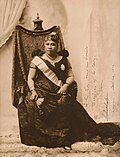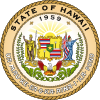The Hawaii Portal Hawaii (/həˈwaɪ.i/ ⓘ hə-WY-ee; Hawaiian: Hawaiʻi [həˈvɐjʔi, həˈwɐjʔi]) is an island state of the United States, in the Pacific Ocean about 2,000 miles (3,200 km) southwest of the U.S. mainland. It is the only state not on the North American mainland, the only state that is an archipelago, and the only state in the tropics. Hawaii consists of 137 volcanic islands that comprise almost the entire Hawaiian archipelago (the exception, which is outside the state, is Midway Atoll). Spanning 1,500 miles (2,400 km), the state is physiographically and ethnologically part of the Polynesian subregion of Oceania. Hawaii's ocean coastline is consequently the fourth-longest in the U.S., at about 750 miles (1,210 km). The eight main islands, from northwest to southeast, are Niʻihau, Kauaʻi, Oʻahu, Molokaʻi, Lānaʻi, Kahoʻolawe, Maui, and Hawaiʻi, after which the state is named; the latter is often called the "Big Island" or "Hawaii Island" to avoid confusion with the state or archipelago. The uninhabited Northwestern Hawaiian Islands make up most of the Papahānaumokuākea Marine National Monument, the largest protected area in the U.S. and the fourth-largest in the world. Of the 50 U.S. states, Hawaii is the eighth-smallest in land area and the 11th-least populous; but with 1.4 million residents, it ranks 13th in population density. Two-thirds of Hawaii residents live on O'ahu, home to the state's capital and largest city, Honolulu. Hawaii is among the country's most diverse states, owing to its central location in the Pacific and over two centuries of migration. As one of only six majority-minority states, it has the only Asian American plurality, the largest Buddhist community, and largest proportion of multiracial people in the U.S. Consequently, Hawaii is a unique melting pot of North American and East Asian cultures, in addition to its indigenous Hawaiian heritage. Settled by Polynesians sometime between 1000 and 1200 CE, Hawaii was home to numerous independent chiefdoms. In 1778, British explorer James Cook was the first known non-Polynesian to arrive at the archipelago; early British influence is reflected in the state flag, which bears a Union Jack. An influx of European and American explorers, traders, and whalers soon arrived, leading to the decimation of the once-isolated indigenous community through the introduction of diseases such as syphilis, tuberculosis, smallpox, and measles; the native Hawaiian population declined from between 300,000 and one million to less than 40,000 by 1890. Hawaii became a unified, internationally recognized kingdom in 1810, remaining independent until American and European businessmen overthrew the monarchy in 1893; this led to annexation by the U.S. in 1898. As a strategically valuable U.S. territory, Hawaii was attacked by Japan on December 7, 1941, which brought it global and historical significance, and contributed to America's entry into World War II. Hawaii is the most recent state to join the union, on August 21, 1959. In 1993, the U.S. government formally apologized for its role in the overthrow of Hawaii's government, which had spurred the Hawaiian sovereignty movement and has led to ongoing efforts to obtain redress for the indigenous population. (Full article...) This is a Featured article, which represents some of the best content on English Wikipedia..
Elias Abraham Rosenberg (Hebrew: אליאס אברהם רוזנברג; Hawaiian: Eliaka Apelahama Loselabeka; c. 1810 – July 10, 1887) was a Jewish immigrant to the United States who, despite a questionable past, became a trusted friend and adviser of King Kalākaua of Hawaii. Regarded as eccentric, he lived in San Francisco in the 1880s and worked as a peddler selling illegal lottery tickets. In 1886, he traveled to Hawaii and performed as a fortune-teller. He came to Kalākaua's attention, and endeared himself to the king with favorable predictions about the future of Hawaii. Rosenberg received royal appointments to several positions: kahuna-kilokilo (royal soothsayer), customs appraiser, and guard. He was given lavish gifts by the king, but was mistrusted by other royal advisers and satirized in the Hawaiian press. Rosenberg and Kalākaua often held long conversations and enjoyed drinking alcohol together; Rosenberg told the king Bible stories and encouraged him to revive traditional Hawaiian religion, an idea that fascinated Kalākaua but angered his political rivals. In June 1887, Rosenberg returned to California, possibly owing to poor health or fear of unrest in Hawaii; a short time after arriving in San Francisco, he died in a local hospital. Soon after his departure from Hawaii, the June 1887 Constitution—which curtailed royal power—was forced upon Kalākaua. A Torah scroll and yad presented to the king by Rosenberg remained in the royal collection. These artifacts were later exhibited with other royal treasures and eventually donated to Temple Emanu-El in Honolulu. (Full article...)This is a Good article, an article that meets a core set of high editorial standards.
Emma Ahuena Davison Taylor (November 13, 1867 – November 8, 1937) was a part-Native Hawaiian high chiefess during the 20th century. She was a cultural historian, a genealogist, and a repository of Hawaiian culture and history who wrote many articles and recollections about the past and influenced her husband, Albert Pierce Taylor, the author of the historical book Under Hawaiian Skies. She was involved in local philanthropic, historical, and civic groups and participated in the women's suffrage movement in the Territory of Hawaii, campaigning for the rights of local women to vote prior to the passage of the Nineteenth Amendment. (Full article...) Selected Picture -'Ōlelo (Language) -This section is here to highlight some of the most common words of the Hawaiian Language, ʻŌlelo, that are used in everyday conversation amongst locals.
Makai
Towards the sea, in the direction of the sea State Facts
State Symbols:
Selected article -Hawaii Five-O is an American police procedural drama series produced by CBS Productions and created by Leonard Freeman (not to be confused with the remake Hawaii Five-0, with a numeral zero as the last character in the title). Set in Hawaii, the show originally aired for 12 seasons on CBS from September 20, 1968, to April 8, 1980, and continues in reruns. At the airing of its last episode, it was the longest-running police drama in American television history, and the last scripted primetime show that debuted in the 1960s to leave the air. The show starred Jack Lord as Detective Captain Stephen "Steve" McGarrett, the head of a fictional state police task force in Hawaii. The theme music composed by Morton Stevens became especially popular. Many episodes in the series would end with McGarrett's catchphrase, "Book 'em, Danno!" (Full article...)Did you know? -
Hawaii News
Wikinews Hawaii portal
Quotes - "The people to whom your fathers told of the living God, and taught to call 'Father,' and whom the sons now seek to despoil and destroy, are crying aloud to Him in their time of trouble; and He will keep His promise, and will listen to the voices of His Hawaiian children lamenting for their homes." — Queen Liliʻuokalani On this day...May 11
Related portalsTopicsCategoriesAssociated WikimediaThe following Wikimedia Foundation sister projects provide more on this subject:
SourcesDiscover Wikipedia using portals |























